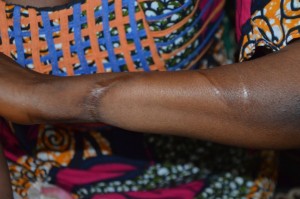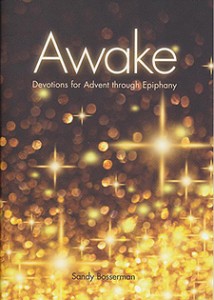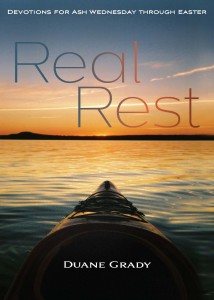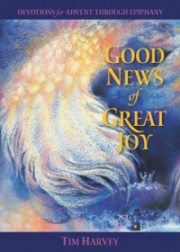By Cliff Kindy, Brethren Disaster Ministries volunteer reporting from Nigeria
Fear of Boko Haram has a major impact on the people of EYN today. Fear has driven most of the members of EYN to move from their homes. That fear impacts where I am allowed to travel as one who works with EYN. That same fear shapes the impressions that members of the Church of the Brethren have of Nigeria.
Fear is the primary tool of violence. Fear is used to immobilize an enemy. Fear can terrorize and incapacitate an enemy. Fear prevents an enemy from considering ways to overcome its power. Fear is used by Boko Haram. Fear is used by the Islamic State. Fear is used by Al Qaeda. The attack on the World Trade Center was an act to stimulate fear. Of course the Islamic State learned its tactics in the prisons and torture chambers of the United States when it controlled Abu Ghraib Prison in Iraq.
The Bible is full of passages that try to debunk fear. The angel’s words to Zachariah in the temple, to Mary when she was told she would carry the Messiah, to the shepherds waiting on their flocks in the dark of night and Jesus’ words to his disciples hidden behind locked doors are all paths to alleviate fear and build courage for the road ahead.
Boko Haram is a new manifestation of fear. It is mostly invisible because few people from the outside have spent time with this group. Those who have experienced the violence of Boko Haram are often immobilized by the shock of the acts carried out by Boko Haram. But what if burial teams of Christians and Muslims went into the areas conceded to Boko Haram and offered to bury the bodies? Those teams might take back conceded space in their willingness to face down fear.
Night and invisibility assist the growth of terror. Boko Haram has learned its lessons well. Surely torture and fear have a long bloody history. The torture chambers of the Inquisition, the hell holes of the Nazi Holocaust, the cells of Guantanamo Prison and the hidden rendition sites of the United States all are training schools of terror and terrorist groups. Their invisibility allows imagination to blow things out of proportion and then glimpses of them can be used to increase fear and terror. The training manual of the School of the Americas (the school now in Ft. Benning, Georgia) refined the tools of fear. Those tools of fear became the tools to “re-form” civil society to fit the needs of Empire. So religious leaders, political activists, union leaders, human rights workers and ordinary farmers became the targets of pressure, torture and death. The parallel school comes from the Israeli military. Its experiences and the tools used to destroy Palestinian society are marketed around the world for dominant political societies to control or eliminate their opposition.
Learning to deal with fear is an important tool for followers of the Prince of Peace, for nonviolent practitioners. I compare the learning process to Arlene’s (my wife) steps in preparing to cook for large numbers of people. She is a good cook but she didn’t start out cooking for a crowd of three hundred. I don’t start out facing down Boko Haram in the village streets of Gwoza, their center of operation in eastern Nigeria. But I do want to reach the place where I would be willing to go there. What if a team went to take gifts to the leaders of Boko Haram? Gifts of one thousand moringa tree (miracle healing tree of Nigeria) starts, a peace choir from the women’s fellowship (ZME) of EYN, a tool box of nonviolent tools to replace the dysfunctional violent tools they use, and a trauma healing team of Muslims and Christians? Acting with this spirit counteracts fear.
When Arlene prepares raised donuts for three hundred people she works in a helpful context. 1) She has cooked donuts often, 2) she has helpers, 3) she has favorite recipes which she has tested, 4) she has tools that expedite the process and 5) she has spaces to let the dough rise, cook in hot fat, cool, hang from dripping racks after icing and 6) spaces to feed hungry people.
When I visit a war zone I try to build a favorable context by reading all I can find about the place. I pray while working in the garden. I dream scenarios of possible situations and my responses. I go by invitation so I know that there are others to walk with me and teammates with whom to work.
I have practiced fear management in other places while working with Christian Peacemaker Teams. When suicide bombers came to our house in Baghdad or when the armed robbers raided our compound in the Democratic Republic of the Congo we spent hours debriefing the experiences. Deconstructing the experiences helps me to understand the pieces and also deal with the trauma.
Yes, trauma does affect most of us in these and other types of situations. Trauma healing works to frame the experience in ways other than terror. Trauma is our body’s safety fuse that blows when fear is about to overwhelm our body’s capacity to cope. But then trauma comes back to haunt us because the normal emotional circuits have been broken and need to be rebuilt through long patient work. Forgiveness is one way that can change the dynamics and understanding of an event. Or if I can understand violence and fear in a way that allows me to envision a positive future then I regain control of my responses in both energizing and life giving ways. So dealing with fear both before it happens and after it happens, and doing it many times, allows me to understand the construction and deconstruction of fear. Maybe this parallels the ease with which Arlene can undertake a cooking assignment for a large group of people.
Realizing that fear impacts any nonviolent actions that I use helps me to recognize my reactions to fear and move to minimize its effect so that I can be the one who takes the initiative rather than being immobilized by the fear that an “enemy” throws at me. What if we held a 50,000 person march from central Nigeria toward the northeast where Boko Haram is ensconced? It would attract heavy media coverage. Muslims and Christians would make up the marchers since both are about equally impacted by Boko Haram’s violence. Invite the Catholic archbishop, the Muslim Emir of Kano and Pope Francis to participate. Take the choir of ZME, the Muslim youth who protected the churches of Christians during Christmas celebrations and the Christian youth who protected the mosques during Muslim holy days. The message would be that together we desire a different and better future from what Boko Haram is creating. Invite them to help shape the future in ways that all benefit. Clearly a caliphate with no people, with wells containing dead bodies, destroyed homes, burned medical clinics and destroyed harvests does not lead to a workable future.
I carry tools that counteract fear too. The New Testament is full of tools that re-take the initiative for peace. Paul invites us to overcome evil with good. Jesus says to love our enemies, pray for those who misuse us, feed our enemies if they are hungry and give them something to drink if they are thirsty. He said that the peacemakers are blessed!
Sure, we could encourage Nigeria to do what the United States military did in Iraq and Afghanistan, Somalia and Libya, Syria and Yemen… I don’t wish that on Nigeria. I think we have much more effective tools at our disposal. The suggestions I have peppered through this writing may not be the ones for Nigeria but perhaps they can stimulate even better and more creative ideas for Nigerian peacemakers to use.
Ananias in Acts 9 is resistant to the prodding of Jesus because of his fear but finally agrees to lay hands on the Boko Haram leader of the early church. So Saul/Paul regains his sight and receives the Holy Spirit. He is transformed, as is Ananias. This Paul goes on to write about half of my New Testament. So where are the Ananiases in Nigeria who, in spite of their fear, will lay hands on the Sauls of Boko Haram? See, one needs to be close to them to do that — close enough to share some of Arlene’s donuts with Boko Haram.








